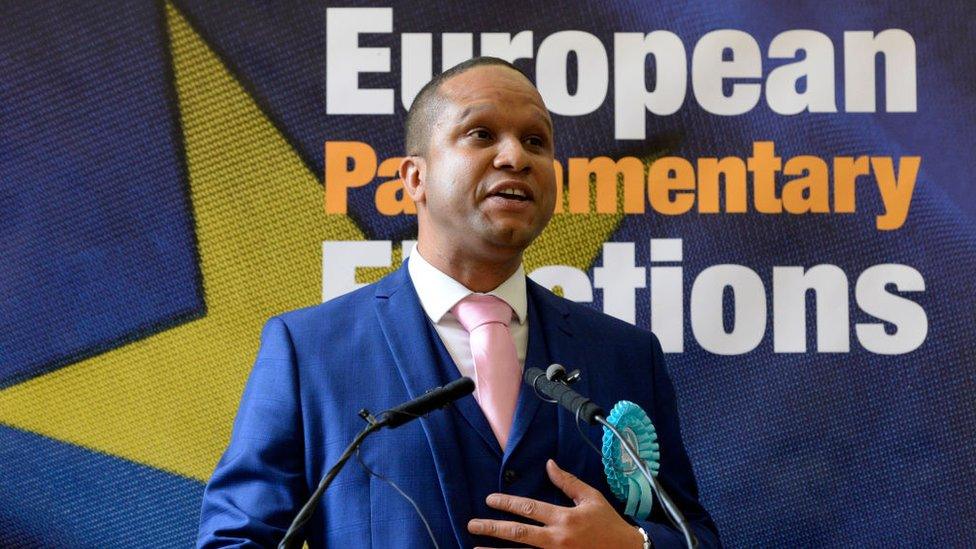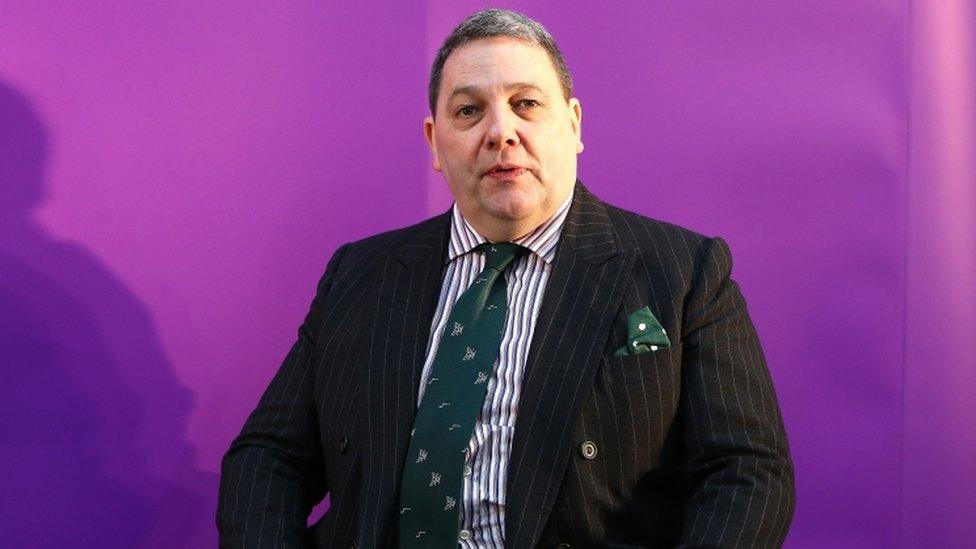General election 2019: Brexit Party MEP quits as candidate
- Published

Louis Stedman-Bryce was elected as a Brexit Party MEP for Scotland in May's European election
The Brexit Party's MEP for Scotland has quit as a general election candidate in protest at its decision not to field candidates in seats held by the Tories.
Louis Stedman-Bryce said he backed an agreement with the Conservatives in Scotland to help fight the SNP.
But he said he could not support the UK-wide arrangement because he does not approve of Boris Johnson's proposed Brexit deal.
Mr Stedman-Bryce had planned to stand in the Glasgow North East constituency.
But he tweeted on Tuesday afternoon that he had decided not to stand because "I do not trust Boris Johnson to deliver the kind of Brexit I voted for. I believe that the deal he has proposed would be devastating to our country and our future prosperity".
He said he had made the decision not to stand in the election with a "heavy heart", adding: "Whilst I supported a localised agreement with the Tories in Scotland to help prevent the onslaught of the SNP, I cannot support standing down PPC's across all Tory seats."
Mr Stedman-Bryce was elected as one of Scotland's six MEPs in the European election earlier this year.
Brexit Party leader Nigel Farage had planned to run candidates in 600 seats after Prime Minister Boris Johnson rejected its offer of a "Leave alliance" to deliver Brexit.
But Mr Farage announced on Monday that his party will now not stand in 317 seats won by the Tories in 2017 after what he described as Mr Johnson's "shift of position" on Brexit.
Mr Farage had been under pressure not to split the pro-Brexit vote in the general election on 12 December, with some of the party's own candidates said to have been concerned that they could hand victory to Labour, potentially leading to another EU referendum.
He said his party would instead focus on trying to take seats held by Labour, whom he accused of "betraying" its Leave-supporting voters.
Mr Johnson welcomed Mr Farage's move, calling it "a recognition that there's only one way to get Brexit done, and that's to vote for the Conservatives".
Labour leader Jeremy Corbyn said Donald Trump "got his wish" when Mr Farage announced his electoral strategy.
He said the Brexit Party leader was offering a "Trump alliance" that would lead to "Thatcherism on steroids" and threaten the future of the NHS.

David Coburn does not want the Brexit Party to field any general election candidates in Scotland
Meanwhile, a former Brexit Party MEP in Scotland, David Coburn, has urged Mr Farage to stand down his candidates in all 59 Scottish constituencies in order to "give the Conservatives a good run at things".
He said it would be "utterly disastrous" if the Brexit Party was to field candidates in constituencies such as Stirling and Ochil, which were narrowly won by the Conservatives in 2017 and which have been targeted by the SNP.
Mr Coburn, who was previously the head of UKIP in Scotland, said: "We want to make sure we do not let the SNP in, and all they (the Brexit Party) are going to do is divide the vote - especially the Brexit vote".
SNP leader Nicola Sturgeon has previously claimed the Conservatives have "effectively become the Brexit Party".
She added that defeating the Tories in Scotland "will help deprive Boris Johnson's increasingly extreme and right-wing party of the majority they crave".
Anti-Brexit parties Plaid Cymru, the Green Party and the Liberal Democrats have agreed not to stand against each other in 60 seats across England and Wales.
Their pact means that in Wales, two of the parties will agree not to field a candidate, boosting the third candidate's chances of picking up the Remain vote.
In England, it will simply be a two-way agreement between the Lib Dems and the Greens.